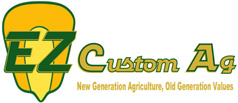Morning guys Evan here with EZ Custom Ag continuing our series on Field GX from AgriGold. This morning we’re going to be talking about Family G. A family that’s not a whole lot different from a Family F, but it does have some some defining characteristics that do make it a little bit different for different management styles.
So, when we look at flex, we’re still looking at kernel flex just like a Family B or Family F, long grain fill period and late nitrogen. So when we look at, kernel flex that kind of determines how long our grain fill is. With Family G having a long grain fill, we know that we’re going to need late nitrogen to keep that plant alive, so in Family G most of those are in the longer maturities. They don’t travel as well north because they need late heat units to keep that plant cranking, and to get it to maturity.
When we look at a long grain fill with kernel flex, that also brings the high test weight, so the Family G’s also have great test weight just like Family F. They’re able to go almost anywhere, but instead of having wet feet tolerance like a Family F does, Family G’s need to have well -grained soils. They can’t handle all that moisture, but one thing that does come with them is they have a better disease tolerance package. Might not be perfect; may still be a consideration for fungicide, but it’s not like a Family F where it has to happen or it’s not going to be a success for you, so these are the guys that make the decisions in season if they’re seeing pressure, and if they’re seeing the conditions for it. That’s the kind of guys that will plant these hybrids because that gives them the flexibility.
Hey, you don’t have to make that decision in January you can make it in June or July and still have a successful crop. Not a whole lot of characteristic differences between a Family G and a Family F, but just some slight ones that can really change where we place these hybrids.
Very strong family with great high yields. You’ll see them, they’ve been winners in different contests. One to definitely give some thought to when you’re thinking about what hybrids you want on your farm this next spring.
So we’ll see you next time in front of the whiteboard, guys.
